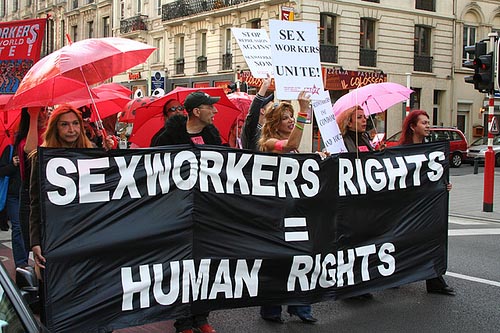Yes,” Eliot Spitzer told host Chris Hayes on MSNBC, he is a feminist. Hayes had just played him a clip in which Sonia Ossorio, the National Organization for Women’s (NOW) New York City chapter president, denounced him for paying for sex. “Do we want an elected official,” Ossorio asked, who has “participated in sustaining an industry that we all know has a long history of exploiting women and girls?” Spitzer countered that, as governor, he passed a tough anti-sex-trafficking law (never mind that he broke part of it).
It was a conflict you rarely see in public: two people competing for feminist cred over sex work—Spitzer the prosecutor (and repentant customer), Ossorio the spokeswoman (that sex workers never asked for). As is often the case, their sex trade bona fides don’t extend to actually having done sex work, but in using sex workers to make a political point.
What they missed was that they were shouting from the same side of the stage: Both NOW’s Ossorio and comeback-hopeful Spitzer believe the right thing to do is enact laws that result in taking power away from sex workers and putting more of them through the criminal-justice system. Both are losing propositions in which those who suffer most are the women who are already among the most marginalized and criminalized individuals in our society.
Demanding that police conduct more anti-prostitution stings may identify some people who are forced or coerced into the sex trade, but they will result in many more sex workers going to jail. Look at the numbers for just last week’s multi-day, multi-city stings against people in the sex trade, Operation Cross Country, conducted by the FBI in concert with local law enforcement.
The FBI boasts that it charged 150 people it describes as “pimps.” The FBI left off their press releases the 41 adult women arrested as sex workers during the course of these raids in Las Vegas, or the 64 adult women arrested as sex workers in Louisiana, or countless others who did not appear in local news reports. What will happen to those women, now that they have criminal records? How will time in jail or even a court-mandated program provide them with an alternative income?
Just passing tough laws against prostitution doesn’t make any material improvements in the lives of sex workers. In fact, such laws can put sex workers’ lives at stake. According to a Human Rights Watch investigation that included interviews with over 200 current and former sex workers in New York, Washington, San Francisco, and Los Angeles, there is a widespread pattern of police seizing sex workers’ condoms during the course of an arrest. Law enforcement justifies this practice as collecting “evidence.
” Of sex workers surveyed by the PROS Network (Providers and Resources Offering Services to Sex Workers) and the Sex Workers Project at the Urban Justice Center, 42 percent had their condoms seized by the police, and nearly half had at some point not carried condoms for fear of police repercussions. A law against condoms-as-evidence passed the New York State Assembly this June, and New York’s City Council is considering a similar resolution. If Spitzer and NOW need a feminist issue, this would be an ideal one, as it’s something sex workers themselves are calling for.
The comparative absence of sex workers’ voices in the media is why Ossorio can cast Spitzer as an exploiter, though to those of us who have done sex work, as a client he sounds only typically, if not commonly, irritating. Married and with a stable job, he was a regular who booked multi-hour appointments. As an affidavit revealed, Spitzer had trouble adhering to escort agency protocol (he blamed the ATM when he didn’t have enough cash on hand; he balked at sending wire transfers as requested). Reporting back to the agency madam on an appointment with Spitzer, Ashley Dupre said, “I don’t think he’s difficult.
I mean … it’s just kind of like … whatever.” In sex work, “whatever” in the context of a client can be commonplace, even welcome—boring is at least predictable. I can say that with some authority, not just because I did sex work, but because I’m in a position in my life to come out and write that—I was already working as a writer and journalist when Spitzer stepped down in 2008. Writing meant I had another source of income, and publishers-willing, a platform. If more sex workers who wanted to speak publicly had the material support I have, and if the media and politicians would listen to them, Ossorio, Spitzer, and all those who share their anti-prostitution positions—that are at heart anti-prostitute—would face far more challengers.
Though they now appear to take opposing positions on sex work, it shouldn’t be surprising that Ossorio once worked alongside Spitzer to pass anti-prostitution laws. In 2007, she launched NOW-NYC’s campaign for New York’s sex trafficking law, appealing to the governor to create new ways to prosecute even more people for buying sex. “Ironically, Spitzer was very focused on beefing up penalties against the clients of sex workers, on the grounds this would be a deterrent to prostitution,” Juhu Thukral wrote in 2008, when she was the director of the Sex Workers Project (SWP) at the Urban Justice Center.
Ossorio demanded those increased penalties as both a political and criminal justice strategy. “If we don’t stem the tide of demand for prostitution, that demand will continue to be met by coercion, violence, force and exploitation,” reads Ossorio’s bio on the website “New York’s New Abolitionists.” “Our great challenge as a society is to change attitudes, to stigmatize going ‘to a prostitute.'” Though the anti-prostitution activists were by some measures successful—they passed their law—the legislation didn’t stoke enough stigma to stop even the man who signed it from going to a prostitute.







